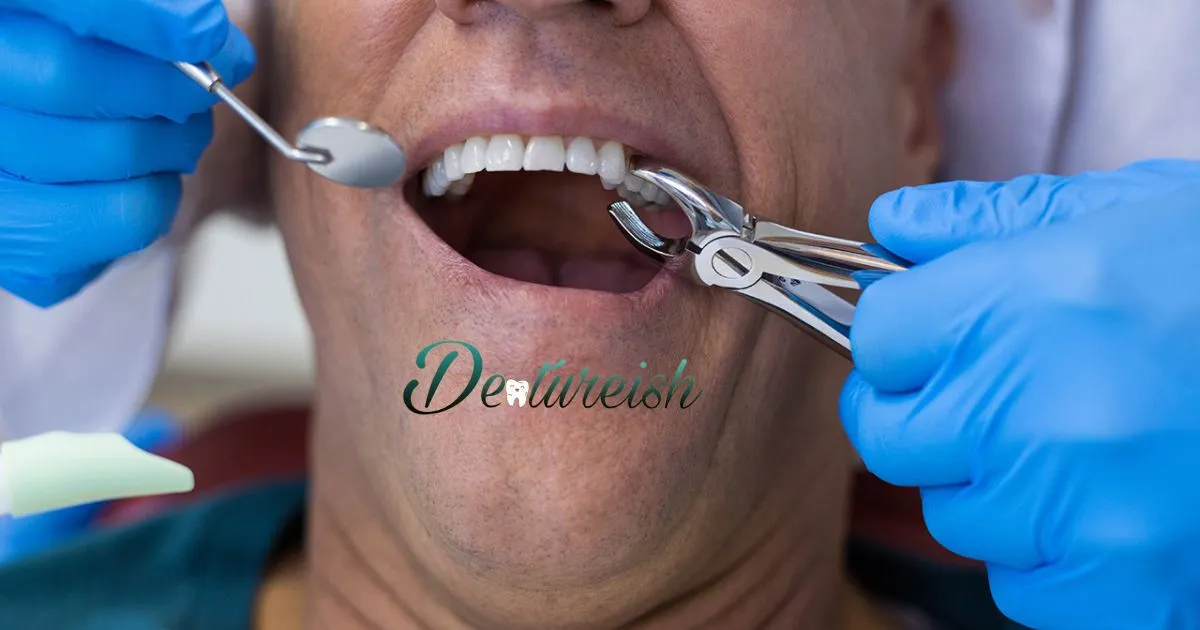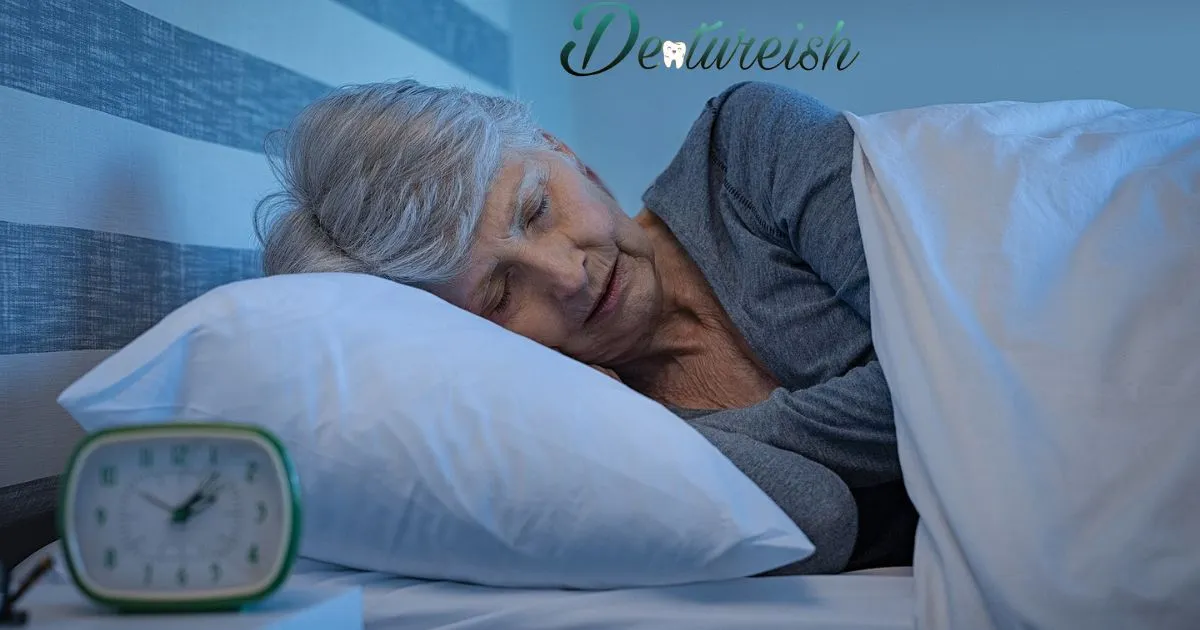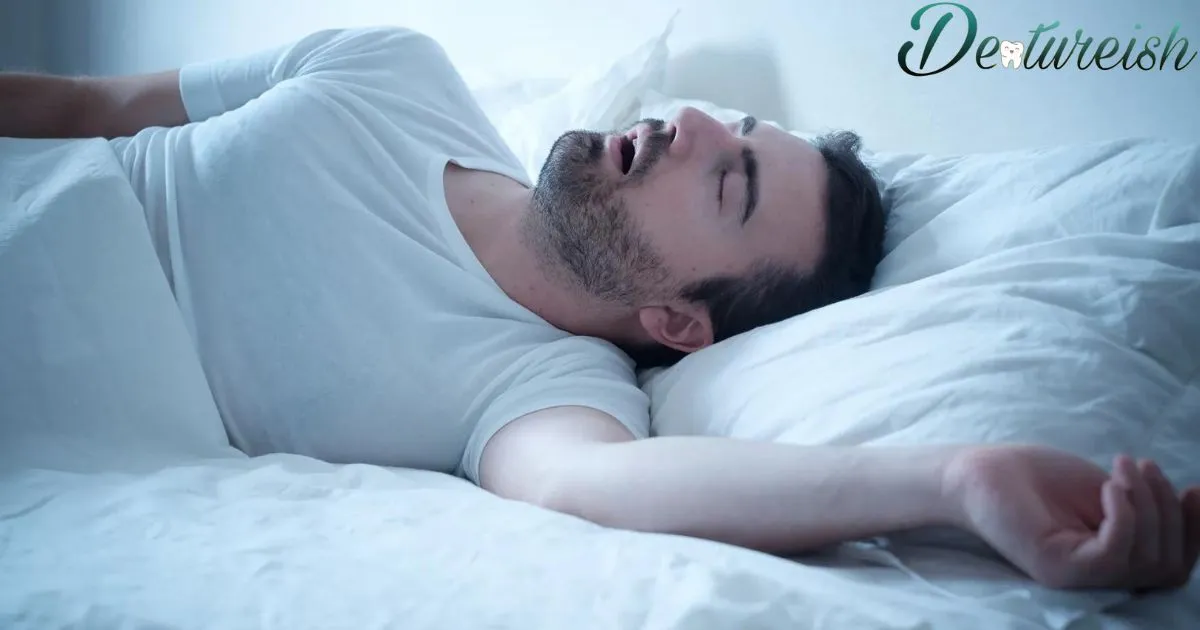Sleeping with partial dentures in your mouth means wearing your removable partial dental appliance overnight while you sleep. Partial dentures replace some missing teeth and assist chewing and speech. They have a plastic base with artificial teeth, supported by metal clasps that clip onto remaining natural teeth.
Can you sleep with partial dentures in your mouth? Many patients want to know if it is safe and recommended to wear their partial dentures overnight. Some report being told by dentists to keep partials 24/7 during an initial adjustment period. However, sleeping in your partial denture is generally inadvisable.
Wearing partial dentures at night can lead to accelerated wear, warping, fungal infection under the plastic base called denture stomatitis, gum irritation, and increased bacteria. Nighttime removal allows oral tissues to rest and promotes better long term denture health and fit. So while adjustment may require initial 24 hour wear, always removing partials at bedtime is ideal long term care.
Is it safe to sleep wearing my partial dentures?
Sleeping with partial dentures is generally not recommended. Overnight wear increases risk of fungal and bacterial growth under the denture base which can cause stomatitis gum infections. It also accelerates wear and distortion leading to ill-fit.
The plastic and metal components need overnight rest from chewing forces. And people over 85 have significantly higher pneumonia risk sleeping in any dental prosthesis. For optimal denture health and oral hygiene, it’s best to remove partials at bedtime.
Your dentist may initially advice 24/7 wear during the first adjustment phase after receiving new partial dentures. This allows your mouth to adapt to the appliance while ensuring proper realignment each day.
But extended sleep wear should be limited to only a short transitional period. Nightly removal remains the healthiest long term protocol to follow for proper care and function.
What are the risks of sleeping in partial dentures?
Sleeping in your partial denture increases risks of fungal and bacterial growth, distorted shape, accelerated wear, gum irritation, plaque buildup, and elevated respiratory infection rates. Yeast and bacteria thrive in the warm moist environment under the denture plastic pressed on gum tissue overnight.
This leads to painful inflammation or stomatitis. The overnight chewing forces also slowly warp and misalign the partial compromising future fit and tooth engagement. And plaque accumulates much faster, harming gum health.
Should partial dentures be removed at night?
Yes, partial dentures should be removed at night before sleep for optimal denture and oral health. Nightly removal prevents fungal infection, warping, accelerated wear, plaque buildup, and gum irritation. It allows your gums and oral tissues to rest and recover.
Cleaning the partial denture before bed also removes any accumulated daytime food debris and bacteria buildup helping combat infection and odors.
When is it okay to sleep in my partial denture?
Sleeping with your partial denture in place may only be recommended during the initial adjustment period after receiving newly custom fitted appliances. Your dentist may advise 24/7 wear for the first few days or weeks post-delivery.
This initial extended wear, during which you sleep with dentures in your mouth, allows your mouth tissues to adapt to the partial shape while the dentist evaluates proper alignment and engagement. However, it’s important to note that long-term nightly removal remains the best practice for maintaining optimal oral health and ensuring the longevity of your dentures.
What if I forget and fall asleep with partial in?
If you accidentally fall asleep a night or two with your partial still in, don’t panic. Just monitor your gums and oral tissues closely in the following days. Look for signs of redness, swelling, irritation, discomfort or infection.
Carefully inspect your partial for any cracking or distortion as well. Maintaining diligent overnight cleaning and observation will help compensate for any temporary lapses in removal habit.
Try to train yourself to make nightly removal part of your regular sleep prep routine. Developing consistent positive behavior is key to avoiding accidental overnight wear. But an occasional slip up won’t cause major issues as long as you stay vigilant with oral and partial care.
Will sleeping in partial dentures affect oral health?
Yes, sleeping in your partial denture can negatively impact oral health. Overnight wear reduces saliva flow allowing more bacteria and plaque buildup which can lead to decay, gum inflammation and bad breath. Lack of nightly removal also denies oral tissues needed rest from denture pressure leading to sore spots, irritation and improper fit over time. Sleeping in partials doubles the risk of developing stomatitis, a fungal infection under the denture base.
Can partial dentures cause gum irritation overnight?
Wearing partials at night allows denture movement which rubs and presses on gums for hours while eating muscles relax. This can lead to painful gum irritation, swelling and sore spots under resting pressure points.
Nighttime removal gives gums, palate and ridges essential recovery time from partial clasps and base contact. Letting oral tissues rebound fully prevents gradual irritation that develops into denture-related sores and lesions.
Does sleeping in partials increase infection risk?

Yes, sleeping while wearing your partial denture significantly increases the risk of oral infections like denture stomatitis. At night saliva flow drops allowing candida fungal overgrowth under the denture plastic which sits tightly against the gums all night.
This fungal infection causes swelling, redness, bleeding and soreness if left untreated. Nightly denture removal and disinfection helps prevent this common infection.
How can sleeping in partial denture impact fit?
The warmth and moisture trapped against gums overnight accelerates warping and distortion of the acrylic base. As the partial subtly shifts out of shape it fits improperly.
This leads to rocking, poor stability and decreased chewing ability affecting nutrition. An ill-fitting partial from sleeping in it can also rub and apply uneven pressure on gum tissue worsening irritation.
What oral issues may develop from overnight partial wear?
Sleeping in your partial denture can allow plaque and tartar buildup leading to dental decay and periodontal disease which damages bone support. Gum recession from irritation decreases denture retention and stability.
The moist environment encourages fungal and bacterial growth resulting in infections requiring prescription antifungal rinses or antibiotics. In the elderly, aspiration pneumonia is an additional serious risk if loose partials block airways.
How should I care for partial dentures overnight?
Properly caring for your partial dentures overnight is key to keeping them in good condition. Always remove and thoroughly clean them before bedtime. Use a soft brush and non-abrasive cleaner to gently remove any food, plaque or debris without damaging the delicate components.
Then place them in cool clean water or a storage solution overnight to keep moist and prevent warping or cracks from dehydration. Store properly out of reach of pets who may mistake them for toys.
Never sleep wearing your partial unless advised by your dentist during an initial adjustment period. The plastic and metal components require a rest period overnight to maintain their shape and prevent fungal or bacterial infection.
Allow your gums to breathe as well by giving them a nightly break from the denture base. With proper daily removal, cleaning and overnight storage, your partial will remain functional for longer.
What is the best way to store partial dentures at night?
The best overnight storage method is placing cleaned partial dentures in cool, clean water or an ADA-approved denture cleaning and storage solution. This keeps the acrylic base and metal parts from drying out, preventing cracks and warps from dehydration.
Always use an enclosed denture bath and store partials safely out of reach of pets or children to avoid damage.
Do not simply set them on a counter or soak in hot water which can cause structural damage to the custom-fitted appliance. Proper overnight care promotes longevity so you get years of service rather than needing premature replacement.
Why clean partial dentures before bedtime storage?
Cleaning your partial dentures of all debris, plaque and food particles before overnight storage serves a few key purposes. It removes contaminants that can lead to stains, odors, gum irritation and infection if left on for hours. Thorough cleaning promotes better oral health.
It also prevents any remaining bits of food from inadvertently being left on the partial to foster bacteria or harden making morning cleaning more difficult. Proper cleaning also allows overnight solutions to fully penetrate and hydrate the acrylic base and metal components to keep its form intact.
What solutions keep partial dentures moist overnight?

The best solutions for keeping partial dentures moist overnight are cool clean water, an ADA-approved denture cleaner, or prescription denture storage solution.
These maintenance solutions are formulated to properly hydrate the acrylic resin material used in the denture base preventing it from warping, cracking or drying out during hours of non-wear. This keeps your partial fitting and functioning optimally long-term without premature damage necessitating repair or replacement.
When should I reinsert partial dentures in the morning?
Plan to reinsert cleaned partial dentures after your morning oral hygiene routine. Rinse your mouth with water or an ADA-approved mouthwash after brushing and flossing your natural teeth.
This removes any lingering toothpaste debris that could get under the denture base and cause irritation. Thoroughly rinse off your partial as well before gently placing back into the mouth. Prompt morning reinsertion ensures the partial is in place for eating and clear speech all day.
What steps properly remove partials before sleep?
It is recommended to remove your partial denture before going to sleep each night. Have a clean sink or towel ready to place the partial on before gently rocking it side to side while lightly pulling up to dislodge it.
Never forcefully pry or pull hard as this can damage the clasps and acrylic. Once removed, thoroughly rinse your mouth and brush your gums and remaining teeth to clean away debris. Then proceed to clean the partial itself before overnight storage.
Take care to not drop or bend clasps when handling the dislodged partial. Always inform your dentist if removal is difficult, causes bleeding or leaves partial pieces behind so proper fit can be addressed.
How do I gently take out partial dentures at bedtime?
Bedtime partial denture removal takes patience and care. Have a folded towel or water-filled sink ready to set the partial in when dislodged. Gently manipulate one side back, then the other side to loosen clasps. Slowly pull down and out once loose rather than abruptly yanking. Removal should not cause bleeding or visible gum damage.
If your partial feels stuck, do not force or excessively pull on it as this can crack acrylic or bend metal components.
Stop and contact your dentist if removal causes significant pain. Forcing a partial can lead to damage and oral cuts or infection. Proper assessment of fit by a professional is key for comfortable nightly denture removal over the long term.
Where should removed partial dentures be placed for night?
Once removed at bedtime, immediately place your partial denture in cool clean water or a storage solution overnight. This prevents the acrylic base from drying out and distorting.
Do not set it on a counter or napkin where it can easily be knocked over and cracked. It is advisable to invest in a denture bath container specifically designed to keep partials and dentures immersed. Change the soaking solution daily.
For safety through the night, the bath container should be placed on a stable bathroom or nightstand surface out of reach of pets who may see it as a chew toy. Keeping your partial properly stored overnight ensures it remains functional for daily reinsertion. Never leave partials out to dry overnight.
Should I rinse my mouth after taking partials out before sleep?
Yes, you should rinse your mouth after removing your partial denture at bedtime. This clears away any remaining food debris or plaque on your gums and teeth. Use an antimicrobial mouthwash to thoroughly cleanse areas under and around the partial base. Brush remaining natural teeth well before bed.
Rinsing and brushing without the partial inserted allows you to access areas easily covered by the appliance during the day for more effective oral hygiene. Nightly cleansing protects gums from infection and sensitivity that closed-in partials can promote over time. Let tissues air out while sleeping after a good rinse and scrub.
Is there a correct partial removal technique before bed?
Yes, following the proper partial removal steps before bed makes the process smooth and prevents damage. Have a clean folded towel or filled sink ready to receive the dislodged partial for cushioning.
Gently manipulate one side back, then the other to free clasps from teeth. Never force or abruptly pull. With light pressure, ease it down and out of the mouth once loosened.
Immediately rinse your mouth and brush gums and teeth thoroughly after removal. Then proceed to gently clean the partial itself before placing it in an immersion bath or storage solution for the night. Correct technique nightly protects your oral health and keeps your partial functioning properly for daily insertion each morning.
Who can I ask about sleeping with partial dentures?
Your dentist who created and fitted your partial denture is the best resource for guidance on proper wear, including overnight use. Schedule an appointment to discuss your sleep habits and ask if it is recommended you sleep wearing your partial. Clarify the oral health and fit impacts overnight wear may have.
Dentists aim for well-informed patients so don’t hesitate to request sleep protocol advice. If discomfort or complications arise from sleeping in your partial, promptly notify your dentist as well. Denturists, oral surgeons, and urgent dental care providers can also advise whether sleeping in your partial is appropriate.
Seek secondary opinions if your regular dentist is unavailable or you want reassurance on best practices. However, the dentist crafting custom partial dentures for your mouth has the greatest familiarity with your appliance and restoration needs. Maintain a dialogue with your treating dentist for ongoing sleep and denture use guidance.
Should I ask my dentist about sleeping with partial in?
Yes, you should specifically ask your dentist if you can or should sleep wearing your partial dentures. Do not assume it is safe without confirming first. Many dentists recommend removing partials at night but some patients may require short-term 24/7 wear during initial adjustment.
Know your own prescribed guidelines for daytime versus overnight wear. Report any issues sleeping with partials in place like discomfort, gum irritation, loosening, or damage. Your dentist can adjust the fit, realign the partial, or repair damage when promptly notified.
What if I have discomfort sleeping with partial dentures in?

Notify your dentist promptly if sleeping in your partial denture causes discomfort like rubbing, loosening, gum irritation or pain. Schedule an appointment to have the fit evaluated and make adjustments to the plastic base or metal components to ease night wear. New partials may require some break-in refinement.
Address discomfort right away before small issues become more problematic. You should not need to tolerate unpleasantness or oral health impacts from necessary nighttime partial removal. Ask your dentist what relief is possible while you adapt to wearing your restoration full-time.
Who can help if partial denture breaks overnight?
If your partial denture cracks, breaks or has a damaged component from overnight wear, immediately contact both your general dentist as well as any local urgent dental care centers.
Your dentist can best repair or replace the custom partial but an urgent care dentist can promptly remove any broken parts irritating your gums and ease pain until your dentist appointment.
Always seek professional help rather than attempting makeshift repairs yourself. With prompt assessment and treatment, a damaged partial can usually be swiftly restored or replaced so you maintain function.
When should a sleep-related partial denture issue get prompt care?
Seek the same or next day urgent attention for any bleeding, swelling, severe discomfort, loose parts or suspected damage from sleeping in your partial denture. These symptoms suggest irritation or injury that will likely worsen without timely care.
An urgent care dentist can relieve pain until your own dentist can repair or replace the partial. Prompt help prevents exacerbation and allows dentists to preserve as much remaining tooth structure as possible. Do not delay when problems arise from improper partial use during sleep. Addressing issues early better protects your oral health.
Frequently Asked Question
Is it okay to sleep wearing my partial denture?
No, most dentists recommend removing partial dentures at night.
What oral health issues can sleeping with partial dentures cause?
Sleeping in partial dentures can increase your risk of fungal infections, gum irritation, plaque buildup, and other oral issues.
Should I clean my partial denture before bed if I sleep with it in?
Yes, always clean partial dentures thoroughly before storage to remove food debris and bacteria.
Can sleeping in partial dentures impact the fit or cause damage?
Wearing partial dentures overnight can warp and distort the plastic base leading to a loose, uncomfortable fit needing dentist adjustment.
Who do I talk to if I have issues sleeping with my partial denture?
Contact your dentist promptly if you have any discomfort, complications or concerns sleeping with your partial denture.
Conclusion
Most dentists do not recommend sleeping with partial dentures in place. As sources explain, keeping partials overnight increases infection risk, plaque buildup, gum irritation, and potential denture damage over time. Saliva flow reduction wearing partials to bed also endangers your oral health.
If you forget and sleep in your partial, promptly clean and inspect it in the morning for distortion issues before reinserting. Report any discomfort, complications or damage from overnight partial wear to your dentist right away. With proper nightly removal care, your custom designed partial dentures can serve you comfortably and effectively long-term.

